 History
History  History
History  Weird Stuff
Weird Stuff 10 Wacky Conspiracy Theories You Will Need to Sit Down For
 Movies and TV
Movies and TV 10 Weird Ways That TV Shows Were Censored
 Our World
Our World 10 Places with Geological Features That Shouldn’t Exist
 Crime
Crime 10 Dark Details of the “Bodies in the Barrels” Murders
 Animals
Animals The Animal Kingdom’s 10 Greatest Dance Moves
 Movies and TV
Movies and TV 10 Box Office Bombs That We Should Have Predicted in 2025
 History
History 10 Extreme Laws That Tried to Engineer Society
 History
History 10 “Modern” Problems with Surprising Historical Analogs
 Health
Health 10 Everyday Activities That Secretly Alter Consciousness
 History
History 10 Dirty Government Secrets Revealed by Declassified Files
 Weird Stuff
Weird Stuff 10 Wacky Conspiracy Theories You Will Need to Sit Down For
 Movies and TV
Movies and TV 10 Weird Ways That TV Shows Were Censored
Who's Behind Listverse?

Jamie Frater
Head Editor
Jamie founded Listverse due to an insatiable desire to share fascinating, obscure, and bizarre facts. He has been a guest speaker on numerous national radio and television stations and is a five time published author.
More About Us Our World
Our World 10 Places with Geological Features That Shouldn’t Exist
 Crime
Crime 10 Dark Details of the “Bodies in the Barrels” Murders
 Animals
Animals The Animal Kingdom’s 10 Greatest Dance Moves
 Movies and TV
Movies and TV 10 Box Office Bombs That We Should Have Predicted in 2025
 History
History 10 Extreme Laws That Tried to Engineer Society
 History
History 10 “Modern” Problems with Surprising Historical Analogs
 Health
Health 10 Everyday Activities That Secretly Alter Consciousness
10 Forgotten Atrocities Committed By The Allies In World War II
The saying goes that history is written by the victors, and that holds very true when it comes to World War II. It is often referred to as the good war, with the Allies depicted as the shining white knights who came to save the entire world from the evils of Hitler and the Japanese. However, while the history books tend to depict the Allies as almost saintly, the reality of the situation was often a lot more disturbing and a lot less flattering.
The Allies committed many atrocities during World War II and its aftermath that they would rather you forgot. While there is no questioning that the Axis were certainly worse, it is clear from the many atrocities committed by the Allies that war brings out the brutality in all of us.
10 The Massive Bombing Campaign Against Civilian Targets In Japan
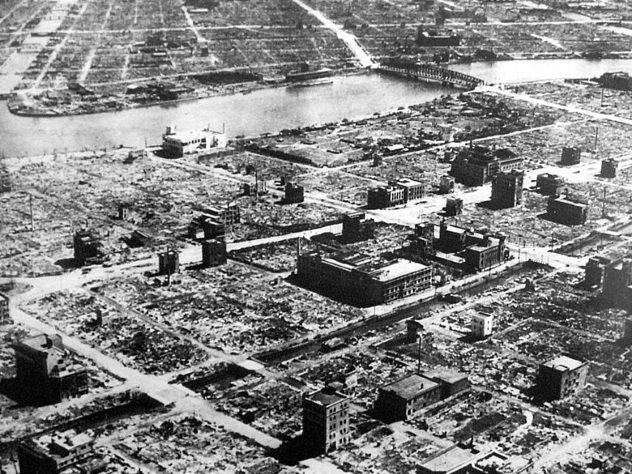
Most people know of the moment in history when the United States dropped atomic bombs on the cities of Hiroshima and Nagasaki. The famous argument for their use was that the Japanese were impossible to bring to surrender and that such a shocking display was the only thing that would prevent a land war that would last decades and cost millions of lives. However, well before the bombings of Hiroshima and Nagasaki, the US had already been bombing Japanese civilian cities on a regular basis to demoralize the enemy and had caused quite a death toll.
In fact, General Curtis LeMay, who ordered the attacks, was of the mind that the Japanese might not actually surrender until they were pretty much all wiped out. It was for this reason that he decided the bombing campaigns of regular Japanese cities were not enough and that the US needed to go for one of their most major cities and do something drastic.
On March 9, 1945, he carried out his plan and ordered an air raid on Tokyo itself, but this was no normal bombing run. The bombers were dropping napalm cylinders and petroleum jelly to firebomb the entire city.[1] More than 40 square kilometers (15 mi2) of city was burned to ruin, with many melted people stacked on top of each other. It was a horrific sight, with at least 100,000 civilians killed. General LeMay even remarked once that the United States may have killed more people firebombing Tokyo than they did in Hiroshima and Nagasaki combined and admitted that he would have likely been charged with war crimes if his side had lost.
9 Russian Soldiers Raped Women After Liberating Poland From The Nazis
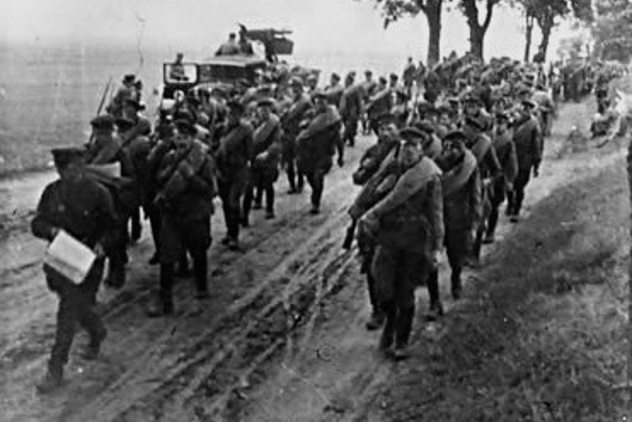
Russia certainly doesn’t have the best reputation among the Allies today and was always the more dangerous part of the faction, but the country was basically essential to stopping Hitler. They not only slowed his advance but came roaring back, pushing across the territory Germany had taken and eventually straight on to Berlin itself. The Russian soldiers were exhausted and demoralized after so much fighting, and with society breaking down around them in many ways, they found it fairly easy to revert to primitive behaviors. While some of this only took the form of looting, the amount of rape that went on is incredibly disturbing. To make matters worse, Stalin actually approved of his soldiers raping enemies—he believed that it was a great way to psychologically destroy them.
There weren’t just revenge rapes against Germans in the major cities. The Red Army at the time was known for liberating camps in countries such as Poland and then raping all of the female victims.[2] After so much horrific fighting, many of these men were only thinking about their basic instincts and also felt that they should be able to take what they want, considering how much of a favor they were doing Europe by liberating it from the Nazis.
8 Operation Paperclip Was Probably Even Worse Than You Already Thought
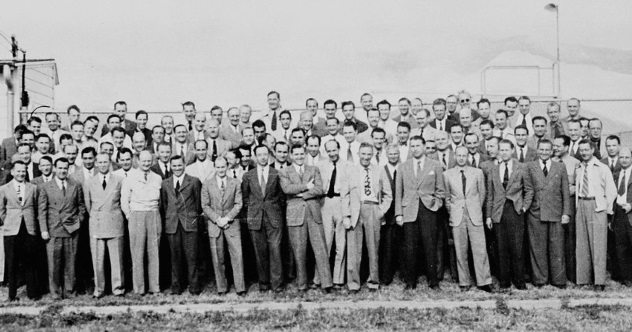
Not everyone knows it by name, but everyone knows the basics of what Operation Paperclip was. During World War II, the United States and many others had been eying the Germans’ technology and all the various things they were working on and desired to gain the Nazis’ scientific secrets. When the war ended, they found that the Nazis were working on many things they hadn’t even imagined, such as nerve agents and a weaponized form of bubonic plague. Instead of trying to destroy all the research on such horrible things, the US decided they needed these scientists for themselves.[3]
The goal was to bring almost 90 German scientists into the United States, whitewash their past a bit, and get them to put their scientific knowledge to work for the US. Now, some may think this wasn’t really that bad, as they were just scientists and possibly following orders. However, these were not nice men. Some of them knew full well how the concentration camps worked and would personally handpick people to slave themselves to death on their projects—just to enjoy the cruelty of it. Others were, as we mentioned, working on chemical warfare and similarly terrible things, making it hard to simply accept the excuse of “following orders.”
Unfortunately, most of these men grew old and grey working for the US government and never saw any real consequences for their actions.
7 US Soldiers Started Collecting Japanese Skulls
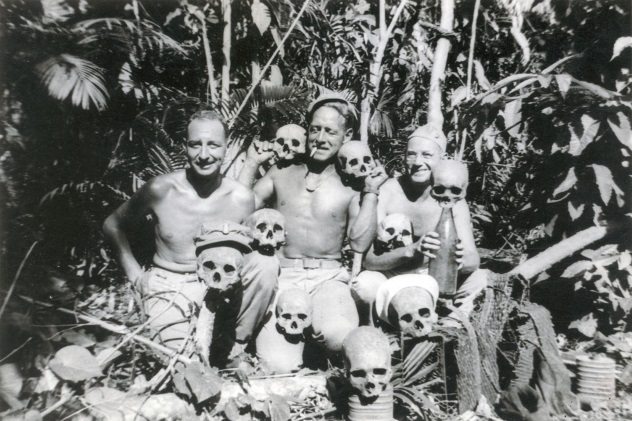
The atrocities of the Japanese during World War II are very well-documented, and in the United States especially, their misdeeds are very well-known. Most people have heard of Japan’s Unit 731 as well as of actions like the Bataan Death March. The Japanese were known for incredibly brutal treatment of prisoners of war and in some cases were witnessed burying captured enemies alive.
However, war brings out the brutality in all of us, and as the campaign in the Pacific dragged on, US soldiers began to perform actions that many people today would find to be shocking and horrific. They started mutilating Japanese corpses and taking trophies, even going so far as to send them back home to civilians, who were actually thankful instead of disgusted. One of the most common things to take were ears because they were easy to cut off and haul away as a trophy, but skulls were the real coup de grace.
Unfortunately, neither process for obtaining the skull was anything short of barbaric. They would either have to boil the head to get the skin off or leave it out long enough for ants to eat all the flesh, leaving the skull underneath intact.[4] To be clear, the United States military leadership officially was against the practice and tried to discourage it, but the soldiers kept taking skulls anyway.
6 The Americans Sent Soviet Dissidents Back To Russia To Die
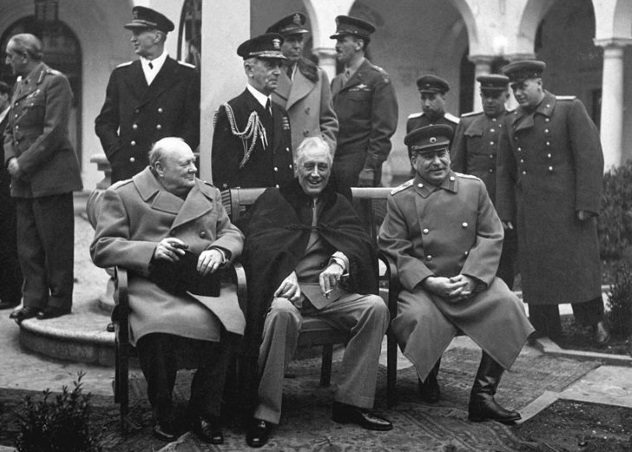
The world was so excited when World War II ended and just so glad to move on that many people completely forgot about some of the worst atrocities that happened directly after the war. At the famous Yalta Conference, one of the less famous things promised was repatriation of citizens trapped in another Allied country’s territory or kept as their prisoners. This seemed like a good idea at the time, and everyone was riding high on their emotions, but before long, it became clear just how brutal and awful such a generalized policy could be.
The United States had a couple million people they had to send back, and many really didn’t want to go back to Soviet Russia.[5] The Americans initially resorted to force, but this led to some suicides, so they started going for a sneakier approach, and the British followed suit. They actually started tricking people, telling them they were taking them somewhere else and then sending them back to the Soviet Union. Many of the people sent back were executed for desertion or other crimes, and others were sent to be worked to death at labor camps.
5 The US And The UK Used German POWs As Slaves Back Home
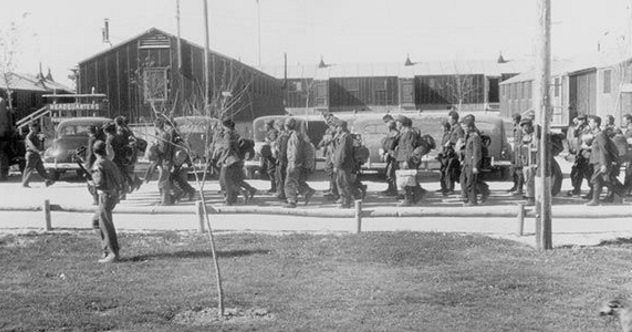
As World War II went on, the British started to end up with a bit of a problem: Storing all of the German prisoners of war and feeding them was becoming an incredible strain on the system. The United States, to help out their ally, agreed to take many German POWs themselves to ease the burden. However, this presented its own issue. The Americans had to find a safe place to put them, and they also were going to be dealing with an increasing burden to care for all these prisoners. And while the Allies did some atrocious things, actual concentration camps of the sort Germany and Japan used were completely out of the question. The Allies were also concerned with actually following the Geneva Conventions, which did not allow for captured soldiers to be used as slaves.
However, both countries quickly decided to go ahead and start using their captured Germans for mass labor, as they had a labor shortage from all their own men fighting the war and had to now take care of hundreds of thousands of prisoners.[6] To get around the fact that they couldn’t technically treat them as slaves, they paid the POWs an incredibly tiny wage. (In England, this amounted to a single shilling a day.) The laborers were often not fed all that well, either, although the governments would claim their own people were also doing without due to war rationing. While Allied POW camps weren’t the horror shows that Axis camps were, abuse still happened, and the Allies still used enemy soldiers as slaves in all but name.
4 Millions Of Ethnic Germans Were Deported To Germany After The War
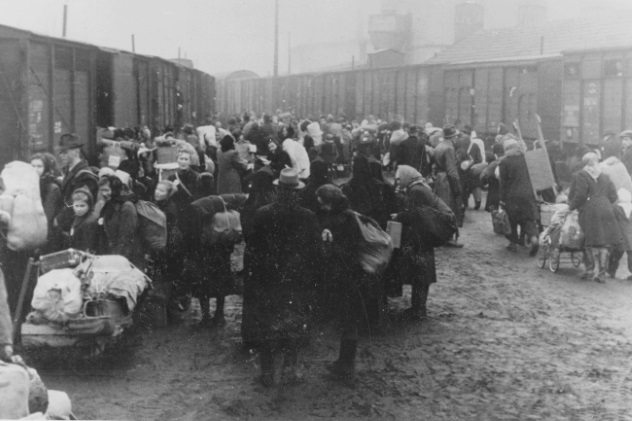
When the war ended, most people think that things quickly became sunshine and roses. However, the aftermath of World War II was incredibly ugly, and the victors didn’t always make decisions that kept the sanctity of human life in mind. In fact, there was a strong desire to get revenge on anyone involved. We all know that the Nuremberg trials brought justice to many Nazi war criminals, but the Allies didn’t save their anger for only the leadership and soldiers. After the war, they approved a plan to forcibly deport 12 to 14 million ethnic Germans back to the ruins of Germany from the various surrounding countries that they had been born in, including Poland.[7]
Most Western history books don’t talk about this because of how shameful it turned out to be. Rough estimates say that about 500,000 civilians died as part of the largest forced migration in known history. To make matters worse, many of these citizens were actually placed into the remains of concentration camps around Germany and were forced to do hard labor as “reparations in kind” for what Germany had done to other countries around them. If this wasn’t bad enough, the vast majority of the people being forced to migrate were women, elderly people, and males under 16 years of age who had been too young to fight in the war.
The sad truth is that the concentration camps didn’t cease operation when the war ended but went on for years afterward, imprisoning ethnic Germans who likely had no say or part in Germany’s initial decision to militarize. In their quest for justice, in this particular case, all the Allies did is get revenge on the wrong people—the innocent.
3 Stalin’s Scorched-Earth Policy

Because the Allies won, when World War II atrocities are talked about, Western history books mostly mention the horrible things done by the Axis. Commonly mentioned is the scorched-earth policy put in place by Hitler. Essentially, if the enemy were going to take a territory, the Germans would burn down all crops, destroy all buildings, and ruin any railroad or other infrastructure to make it harder for the enemy to advance. Many of Hitler’s own commanders thought this was insane and got away many times with actively resisting it. Their argument was that they could always take the place back later, and they felt it would be easier to rebuild if everything wasn’t torn to pieces.
However, while most people only think of this as a Nazi thing, Stalin also put a scorched-earth policy in place.[8] And his was likely much more brutal than the Nazis’. Stalin had an iron grip on his military, so there would be no ignoring his orders, and he wanted it done proper. He had little care for how it would impact his own civilians or how hard it would be to feed them or move them to a safe place. Stalin had special demolition battalions whose sole job was to destroy infrastructure, crops, and entire towns that they had to leave behind to the Germans.
Stalin’s scorched-earth policy hit Ukraine especially hard, as it was fought over by Germans and Soviets, both using a similar strategy to prevent the other side from advancing. By the end of the war, a huge portion of Ukrainian infrastructure had been destroyed.
2 The Americans And The British Turned Away Many Jewish Refugees
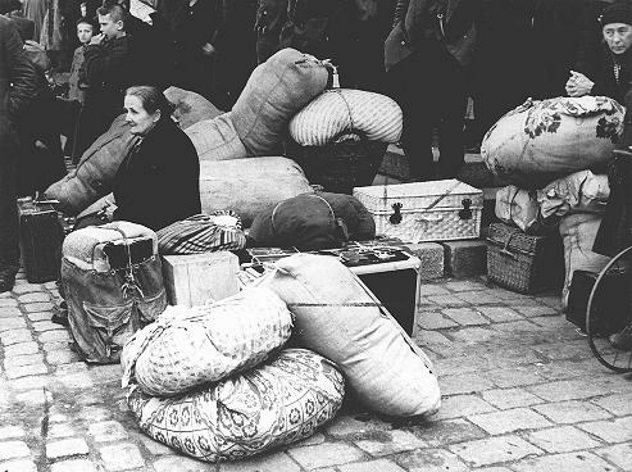
Whenever you mention any of the bad things the Allies did in the war, or anything that we put up with from Stalin, people will always argue that while it was bad, it was outweighed by the fact that we stopped the Holocaust from going any further. In fact, many people seem to be under the impression that the Holocaust was the main reason the United States and many other countries entered the war. The truth is that the United States officially entered the war after Japan attacked and had only been unofficially helping countries like France and England because they were allies.
While there was news filtering out of Germany about what was happening, most countries were more concerned about protecting their own borders than anything, and we didn’t know the full extent of the Holocaust until after Germany had been defeated. The world didn’t fully realize the problem, and Jewish people already had a history of being unwelcome in many parts of Europe and around the world, which made it easier for Hitler to massacre so many of them.
The United States in particular, while acting the hero today, turned away possibly as many as hundreds of thousands of Jewish refugees over the course of the war, refusing to increase their quotas for those regions despite the horrific circumstances.[9] Unfortunately, the British weren’t much better. While they did take in some refugees, they actually made it harder for the Jewish people to use an agreement that allowed them to take refuge in what was then Palestine. Many Jews who couldn’t make it to Palestine or into the US ended up being taken in by other European countries. Many of these countries then fell to Germany, putting the Jewish refugees right back in the arms of Hitler. Most died in the Holocaust.
1 Canadian Troops Burned Down An Entire Town In Revenge
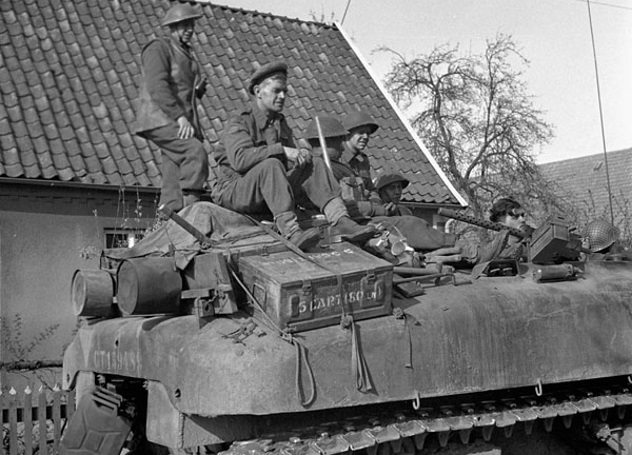
Today, Canadians are known for being some of the nicest people on the entire planet. They take in loads of refugees with much less red tape than most countries, and their main national fault is apologizing too much—something they keep apologizing for and thus perpetuating the cycle. However, as previously mentioned, war brings out the brutality in all of us, and Canada was no exception. Near the end of World War II, part of the Canada Corps were fighting off some of the last German resistance and ended up in a pitched battle near a town called Friesoythe—home to about 4,000 German civilians.
While they were advancing on Friesoythe to mop things up, the Canadians’ leader was killed in the midst of battle. An erroneous report went around that he was killed not by a German soldier but by a civilian sniper who had cowardly shot him in the back. The acting commander was so incensed that instead of taking the time to find out if it was true, he decided to take revenge on the entire town. Once the town was taken over and the population had fled, the Canada Corps set about burning it all to the ground.[10]
Read more about the atrocities of World War II on Top 10 Allied War Crimes of World War II and 10 Japanese Atrocities From World War II.








